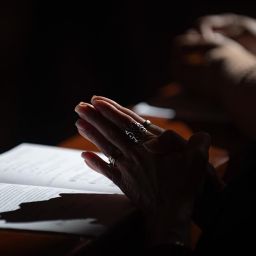By Father John Bayer, O.Cist.
Special to The Texas Catholic
At Cistercian, we had an incredible view of the total eclipse on April 8. After weeks of wondering whether the weather forecast would prove true – total cloud cover and even rain – we excitedly noticed the sun piercing through the clouds just as the school was processing to the abbey to celebrate the Solemnity of the Annunciation. Clouds continued to diminish during Mass, and afterward we walked with gratitude to the football field to await totality.
It was amazing. I’m sure I’ll remember the eerie silence of nature as the wind stilled and every animal seemed anxious or asleep; it was a silence broken only by human beings erupting in wonder as that utterly unique light – that other-worldly silver – ringed the moon and raced upon us.
I had planned to film totality, but soon after it began I thought fiddling with my phone somehow felt profane. Something marvelous was happening, and I didn’t want to trade a powerful experience for a digital record. So, I stopped filming after a few seconds and just let the moment overtake me.
Looking at the short video later, I find the initial shouts of glee both funny and frightening. Everyone sounds ecstatic and startled. I remember feeling outside of myself, and how little control I felt when I found myself spontaneously shouting, “Oh my God!”
I think the eclipse was what the Lutheran theologian Rudolf Otto called a “numinous” experience. When we experience something physically marvelous or personally dramatic, we can understand viscerally our finitude and imperfection because we apprehend, however vaguely, the infinite and perfect. Such awesome experiences inspire fear, because we see our fragility and contingency. But they also inspire desire, because we glimpse what is transcendently great, something we can therefore admire and pursue. Otto called this an experience of “the holy,” of the mysterious “other” that is frightening and humbling (tremendum), and yet also attracting and inviting (fascinans).
In a numinous experience, we see through the terrestrial marvel and discover our awareness of God. Some might try to dismiss this experience as merely psychological, but I think the Catholic theologian Henri de Lubac deftly parried this challenge in his book The Discovery of God:
“It is said that man deifies the heavens. Let it be granted. But where, exactly, did he find the idea of the divine which he applies to the heavens? […] Why that impulse to deify, whether it be the heavens or some other thing? Again, the word ‘god,’ we are told by the philologist, simply means ‘the luminous heaven of day.’ Agreed. But why exactly should the ‘luminous heaven of day’ become man’s god? Yet there are many people who do not even perceive the questions this raises.”
How do we explain the apparently universal impulse among human beings to deify – to call ‘God’ – whatever we sense is immeasurably above us? Our reason will, of course, purify this impulse, because many things might make us feel inferior when in fact we are not. For example, the sun can fill me with awe and remind me that I am not God, but I also know, thanks to reason, that neither is the sun. But then we must ask: How is it that reason knows this? What transcendent height does our reason see that allows us to dethrone ourselves, the sun and everything else – everything besides that height by which it measures all else? The human spirit enjoys a certain kinship with God. As de Lubac said, “there is something sacred in our humble reason.”
In other words, it is a marvel that we human beings can marvel. We can, in some way, grasp the Most High. I have seen many dogs instinctively bark or whine in fear; but I have never seen any animal react to anything with awe. What is interesting is not that an eclipse would affect us emotionally, like a loud noise affects a dog. What is interesting is that within this experience we can discover our own awareness of the One who is Most High. This One is, of course, not the sun; but a dramatic experience of the sun might shake my pride and self-absorption hard enough to help me acknowledge that transcendent height that I somehow always know within, even if perhaps only implicitly. The idea of God is distinct from the occasion or means by which I can discover it.
Plumbing the depths of this idea is vital, for it is what leads us forward in life: to wonder, to search, to measure myself and everything else in this world against a transcendent perfection, a height greater than which nothing can be imagined.
As de Lubac wrote, the human spirit is “obsessed from the first moment of its awakening by a call from above.” If you are close to someone tempted by atheism, invite them to ponder the possibility of a numinous experience. I’ve had them during moments of great decision, of intense personal encounter, on pilgrimage or while witnessing the power of nature. What Height – or Whom! – do we implicitly know that allows us to explicitly know that we are not the highest? What Measure dwells within our spirits and invites us to search for his greatness?
Father John Bayer, O. Cist., is a monk at the Cistercian Abbey of Our Lady of Dallas in Irving.















